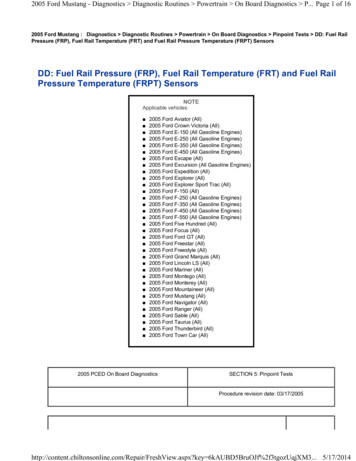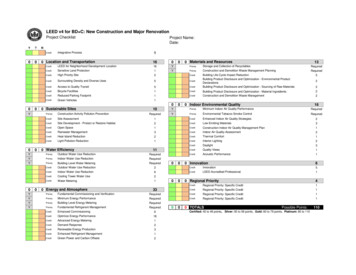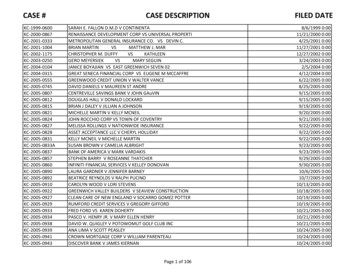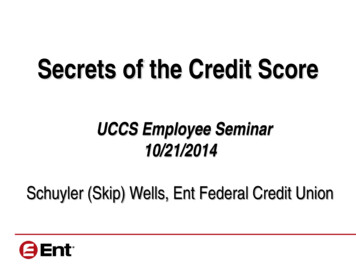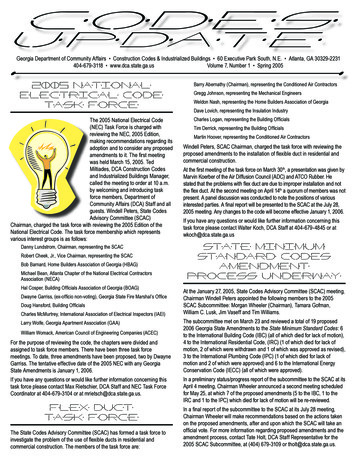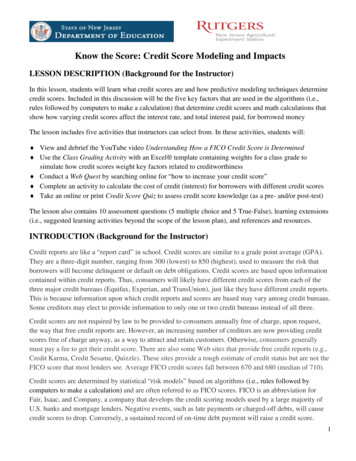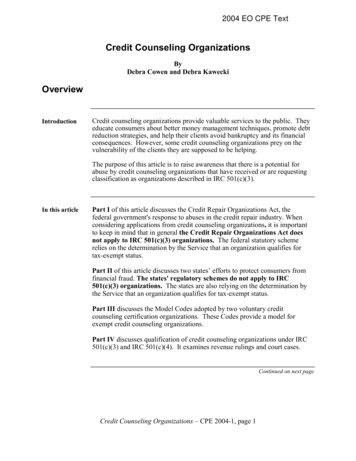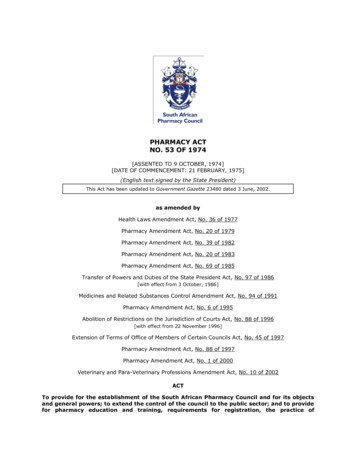
Transcription
THE NATIONAL CREDIT ACT, 2005'All you need to know about the National Credit Act as a consumer'Volume 1: 2007
ForewordThis booklet serves as a guide to the National Credit Act 34/2005(NCA) also referred to as 'The Act'. It is for persons who take upcredit in the form of a loan, lease, instalment sale, credit card orobtaining goods or services on credit, etc from a credit provider.It is also for the use of persons or organizations acting asconsumer credit intermediaries such as advice centres, tradeunion officials and provincial consumer directories. It is anattempt to simplify the provisions of The Act as they pertain to theconsumer. This booklet is not legally binding. Should there beany doubt about the meaning or application of any of theprovisions of The Act, the relevant sections of the legislation aswell as the regulations should be consulted.When using the booklet, please note that at the end of eachchapter there is a glossary simplifying terms for the benefit of theconsumer who may have limited knowledge of credit terms.Where possible, the relevant sections of The Act have also beenindicated should the reader need further clarification on the topicdiscussed.1All you need to know about the Credit Act as a consumer
Contents1Background to the National Credit Act32Consumer credit rights93Credit agreements154Marketing practices255Costs28Termination, surrender and early settlement ofcredit agreements357Defaulting and debt enforcement408Debt counselling449Credit bureaux and credit information5110Disputes and complaints6111Enforcement of the National Credit Act6612Other useful contacts7062
Chapter 1Background to the NationalCredit ActThe aim of this chapter is to give the consumer a generaloverview of The ACT, by answering the following questionsabout The Act:- Why was the Act introduced? What is the purpose of the Act? Which credit providers does the Act regulate? Which credit agreements does the Act regulate?The National Credit Act was introduced to: Promote the economic and social welfare of all South Africans Promote a fair and transparent credit market Protect consumers and their rights in the credit market Regulate all credit providers, Debt Counsellors and creditbureaux Limit the cost of credit Level the playing fields between credit providers bystandardizing the way in which credit is granted by creditproviders, so that consumers can compare what is being offered.3All you need to know about the Credit Act as a consumer
The purpose of the National Credit Act is to: Simplify and standardize the manner in which information isdisclosed in credit agreements. The Act specifies the manner inwhich credit providers have to provide information on creditagreements. The Act also requires that credit providers providethis information in simple language that the consumer canunderstand. The reason for this is that consumers should be ableto read and understand the information so that they can comparethe information on credit agreements from different creditproviders in order to make informed choices. Regulate credit burueax and the information they keep onrecord about consumers. Act stipulates the type of informationthat credit burueax can keep on consumers, how the informationis obtained, used, and for how long that information may be kepton their records. More importantly, The Act aims to ensure thatcredit bureaux keep accurate records on consumers. Ensure that all credit products are handled in the same wayby different credit providers. A credit product refers to themanner in which a credit provider gives credit to a consumer.Examples of credit products include overdrafts, credit cards,personal loans, clothing or furniture accounts. The aim is toensure that the consumer knows that all credit providers willtreat4thesameproductsinthesameway.
Assist over-indebted consumers to restructure their debt.The Act provides for consumers, who are unable to service theirmonthly repayments on their credit agreements, to be assistedby Debt Counsellors to rearrange their monthly repayments withtheir credit providers. The Act also aims to prevent overindebtedness of consumers and to encourage responsiblelending by credit providers. Have one regulator to regulate the entire credit market - theNational Credit Regulator (NCR). The Act establishes the NCR,which is responsible for ensuring compliance with The Act. Creditproviders are required to register with this body in order for themto operate legally. Consumers can lodge complaints regardingcredit providers and credit bureaux with the NCR if they havebeen unable to resolve their disputes directly with the creditprovider or the credit bureaux. Establishing the National Consumer Tribunal to adjudicatematters relating to The Act. The Act further creates the NationalConsumer Tribunal which is an independent consumer courttasked with hearing cases and making orders relating toconsumer complaints and disputes with credit providers,contraventions of The Act and decisions of the Regulator.5
The National Credit Act regulates the following credit providers: Banks Micro lenders Retailers such as clothing and furniture stores All businesses, companies, close corporations and individualswho do business on credit, provide loans, or charge interest onoverdue accounts. In addition, it regulates credit bureaux and Debt Counsellors.The Act regulates the following credit agreements: Mortgage bonds Credit facilities like store cards, bank overdrafts, credit cards,garage cards, personal loans, instalment sales, leases, pawn anddiscount transactions.6 Developmental credit Incidental credit Credit guarantees.
Glossary Credit provider - a party who lends money or provides credit toanother under a credit agreement. Debt Counsellorsindividuals registered with the NCR, whoassist over-indebted consumers to restructure their debt, eitherby way of negotiating with the credit providers includingobtaining a court order on behalf of consumers. Credit bureaux - entities that: retain and disclose for payment, personal (credit)information and receive reports or investigate creditapplications, credit agreements, payment history orpatterns; compile and maintain data from reports containing theabove; issue reports based on the abovementioned data.Credit agreement - an agreement in terms of which a credit providersells goods or lends money to a consumer. The consumer is expected toagree to the terms and sign the agreement. The agreement will containinformation about the credit product that the consumer has applied forand been granted. This information should include questions such as therepayment period, insurance, interest and other fees charged and whatwill happen if the consumer fails to pay his/her instalments.7All you need to know about the Credit Act as a consumer
GlossaryDevelopmental credit - a special type of credit that is created anddefined in the National Credit Act. In terms of The Act, there are threetypes of developmental credit i.e. loans for educational purposes, loansto build, expand or improve low-cost housing and loans to set up smalland medium-sized businesses.Incidental credit When the original agreement for the sale of goods andservices is entered into, between any supplier and consumer theintention is not to extend credit to the consumer. In other words it is not acredit agreement, but due to the consumers failure to pay for the goodsor services on or before a determined date, a fee, charge or interest isadded to the amount due. The agreement is now referred to as anincidental credit agreement. An example of incidental credit would be anoverdue municipal account or an overdue doctor's account.(Sections 5, 8, 10, 12, and 26)OTHER RELATED TOPICS:Consumer rights (chapter 2)Credit agreements (chapter 3Credit burueax (chapter 9)Disputes and complaints (chapter 10)Enforcement of the ACT (chapter 11)8
Chapter 2Consumer credit rightsThe National Credit Act guarantees consumers the followingrights, which will be covered in this chapter: The right to apply for credit The right not to be discriminated against when applyingfor credit The right to be given reasons for credit being declined The right to be given documents in an official languagethat the consumer understands The right to be given documents in a clearlyunderstandable language The right to be given written documentation relating to thecredit transaction The right to confidentiality of personal information The right to access and challenge information held by acredit bureau The right to receive periodic statements.9All you need to know about the Credit Act as a consumer
The right to apply for creditThe National Credit Act provides every person, whether an individual, agroup of people or a company, has the right to apply for credit from anycredit provider. This right, however, does not prevent the credit providerfrom refusing to grant the credit, provided the reason for refusing togrant the credit is based on business grounds that are in line with theirnormal credit risk evaluation processes.(Section 60)The right not to be discriminated against when applying for creditConsumers who are applying for credit are further protected againstunfair discrimination by a credit provider. The Act forbids creditproviders from discriminating against consumers on the basis of colour,race, age, political affiliation, sexual orientation, religious belief, oraffiliation to any particular trade union.A consumer who is of theopinion that he/she has been discriminated against for these reasonsmay act against the credit provider through the Equality Court, or maycomplain to the National Credit Regulator which will refer the matter tothe Equality Court.(Section 61)The right to be given reasons for credit being declinedThe National Credit Act gives a consumer, whose credit application hasbeen declined by a credit provider, the right to request written reasonsexplaining why his/her application for credit has been declined. If thedecision to decline the consumer's request is based on an unfavourablereport received from a credit bureau, the Act stipulates that the creditprovider must supply the consumer in writing with the name, addressand other contact details of the credit bureau from which the creditprovider received the information.10(Section 62)
The right to be given documents in an official language that theconsumer understandsA consumer has the right to receive documents from a credit provider inan official language that he/she understands. Documents that a creditprovider must give to a consumer include the credit agreement,quotations and statements. This requirement is, however, subject toreasonability and factors such as usage, practicality, expenses, regionand the needs of the consumers served by the credit provider. The creditprovider must make a proposal to the NCR on the languages in which itintends making its documents available and the NCR will approve theseproposals.(Section 63)The right to be given documents in plain and understandablelanguageA consumer has the right to receive information and documents in plainlanguage. This means that the contents, meaning and importance of thedocument must be easy to understand. In this regard the National CreditRegulator may issue guidelines to indicate what would be regarded as“plain language”.(Section 64)The right to be given documents related to the credit transactionThe Act gives the consumer the right to receive documents relating to thecredit agreement in a manner that the consumer chooses. A consumermay choose to receive documents either in person at the credit provider'splace of business, or by fax, email, or by a printable web page.11
A consumer has the right to receive one replacement copy of documentsfrom the credit provider, free of charge, but only if the consumerrequests the replacement copy within a year of the delivery of the originaldocuments. For any additional replacement documents, the consumerwill be expected to pay the credit provider.(Section 65)The right to confidential treatmentThe consumer's right to confidentiality is protected by the provisionthat any person or organisation that receives or compiles confidentialinformation on a consumer must use the information for the solepurpose for which the consumer has given his/her consent, unless theusage or release of such information is a requirement in terms of TheAct. The Act further stipulates that the person or organisation holdingthe consumer's confidential information may only release it asspecifically instructed by the consumer or by a court of law. (Section 68)The right to access and challenge information held by a creditbureauThe Act gives the consumer the right to: Access information that a credit bureau has in relation tohim/her. The information must be given to the consumer free ofcharge every twelve months or for a fee if the consumer requeststhe information more than once within twelve months. Such a feemay not exceed R20.00. Challenge and request proof of the accuracy of information heldby a credit bureau. Should a credit bureau fail to provide theconsumer with proof of accuracy of information that theconsumer disputes, it is compelled to remove the disputedinformation from its records,12
Be advised by a credit provider before certain adverseinformation about that consumer is passed on to a credit bureau.The consumer is also entitled to receive a copy of thatinformation on request.(Section 72)The right to receive periodic statementsThe Act stipulates that a credit provider must provide a consumer with astatement once a month or once every two months if the agreement is aninstalment sale agreement, lease or secured loan. A long interval maybe allowed with the consent of the consumer. This interval may, however,not exceed 3 months.With regards to a mortgage agreement the consumer is entitled toreceive a statement every six months.13
Glossary Credit risk evaluation processes - an assessment done by acredit provider to determine whether or not credit will be grantedto a consumer, what level of bad debt can be expected, and whatlevel of risk will be acceptable to justify the profit made. Confidentiality - ensuring that information held on a person isnot released without the consent of the consumer or as requiredby law. Instalment sale agreement - sale of movable property where thepayment is made by way of periodic payments, interest, fees orcharges are payable to the credit provider by the consumer whopossesses or uses the property. Ownership of the propertypasses on to the consumer at the end of the credit agreementperiod. Lease - temporary possession of movable property andpayments are made for its usage. Interest, fees and charges arepayable and the consumer has the option of having theownership transferred at the end of the agreement. Mortgage agreement - an agreement in terms of which credit issecured by way of security in the form of a pledge of immovableproperty, such as a home loan secured by way of a bond over theproperty.OTHER RELATED TOPICS:Credit agreements (Chapter 3)Defaulting and debt enforcement (Chapter 7)Credit bureaux and credit information (Chapter 9)Disputes and complaints (Chapter 10)14All you need to know about the Credit Act as a consumer
Chapter 3Credit agreementsIn this chapter the following topics will be covered: What is a credit agreement? Agreements which are not covered by the Act Pre-agreement statements and quotes Unlawful agreements Implications of unlawful agreements Unlawful provisions in credit agreements Implications of unlawful provisions Changes to credit agreements and increases/decreases incredit facility limits.15All you need to know about the Credit Act as a consumer
What is a credit agreement?A credit agreement can be defined as an agreement between a creditprovider and a consumer in which: The credit provider supplies goods or services or lends money tothe consumer. The consumer pays for the goods or services or repays themoney so borrowed in instalments over a period of time or Where the consumer is to make a single payment, thispayment is made on a future date agreed upon by theconsumer and the credit provider and The consumer has to pay interest, fees or charges on theoutstanding balance of the money borrowed or the amountowing on the goods and services supplied by the creditprovider. The consumer and the credit provider enter into a pawntransaction, discount transaction instalment sale agreement,mortgage agreementorleaseagreement.The credit provider enters into a credit guarantee agreement withone person where this person promises to pay a debt incurred byanother consumer upon receiving a demand from the creditprovider.16(Section 8)
Agreements which are not covered by the Act Agreements where the credit provider and the consumer arerelated, for example where a husband lends money to his wife; Agreements where a member of a stokvel borrows money fromthe stokvel; Agreements where the director of a company lends money to hiscompany; Agreements where a government institution lends or borrowsmoney from any source. For example if a bank borrows moneyfrom the South African Reserve Bank, this transaction is notcovered by the Act.Pre-agreement statements and quotesThe Act requires that a consumer must be given a pre-agreementstatement and a quotation before entering into a credit agreement witha credit provider. A pre-agreement statement is a document whichdetails the terms and conditions of the credit agreement that the creditprovider intends entering into with the consumer. In addition, theconsumer must be given a quotation disclosing the costs of the creditrequired. This quotation must include the principal debt, the interestrate, the total amount payable under the agreement, the instalments andall fees, charges and interest. The pre-agreement statement and thequotation can either be written in one document or in separatedocuments. The quotation that the consumer receives is valid for fivebusiness days. If the credit provider enters into the credit agreement withthe consumer within these five days, he/she is obliged to do so at thesame rate or costs as noted in the quotation.(Sections 92 and 93)(Regulations 28 -31)17
Unlawful AgreementsThe Act declares the following credit agreements as unlawful:- Agreements where the consumer is a minor and was not assistedby a guardian at the time the agreement was signed by theconsumer. If the consumer misleads the credit provider intobelieving that he/she is no longer a minor then the agreementwill be enforceable. Agreements entered into with a consumer who has been declared Agreements entered into with a consumer who is subject to anmentally unfit;administration order where the administrator did not consentto the agreement being entered into; Agreements which are a result of negative option marketing.“Negative option marketing” refers to a situation where a creditprovider offers a consumer credit which automatically becomes acredit agreement unless the consumer rejects the offer. Agreements where the credit provider is not registered with theNCR, despite being legally required to do so. A registered creditprovider is required to display a registration certificate as well asa decal issued by the NCR.N.B. Certain credit providers do not have to register withthe NCR but their agreements are still subject to theprovisions of the Act.(Section 89)(Regulation 32)18
Consequences of unlawful agreementsIf a credit agreement is declared unlawful by a court, the credit providercannot sue the consumer for any monies owing under that agreement.The Act provides that the credit provider must refund the consumer anymonies paid, together with interest at the rate quoted in the agreement.Where it is found that the consumer will be unfairly enriched if all themonies paid to the credit provider are refunded to him/her, such monieswill be forfeited by the credit provider to the State.(Section 89)Unlawful provisions/clauses in credit agreementsThe Act does not allow certain provisions/clauses to be included in creditagreements. The prohibition of these terms and conditions serves toprotect the consumer against certain practices by credit providers.Among the provisions/clauses that are prohibited are:- Provisions/clauses which mislead the consumer or subject theconsumer to potential fraud; Provisions/clauses which determine that the consumer haswaived certain of his/her rights that may apply to creditagreements. The rights that cannot be waived include aconsumer's right to have their debt restructured, the right to haverepossessed goods sold at a fair, market-related price, and theright to dispute any debitsthat pass through a consumer'saccount; Provisions/clauses which require the consumer to acknowledgethat he/she has received goods or any information from thecredit provider, before the goods or information have actuallybeen received by the consumer;19
Provisions/clauses which require the consumer to agree to forfeitmonies paid to the credit provider in the event of the consumerterminating the agreement; Provisions/clauses which require the consumer to leave itemssuch as identity document, bank cards or PIN numbers of bankcards with the credit provider; Provisions/clauses that authorize the credit provider to set-off aconsumer's debt against an asset or account of the consumerheld by the credit provider, except where the consumer has giventhe credit provider specific instructions specifying which assetsmay be set-off against which credit agreement.The following common law rights or remedies that are available to theconsumer may not be waived in a credit agreement. Exceptio errore calculi refers to a defence based on an error in Exceptio non numerate pecuniae refers to a defence by a partycalculationwho was sued on a promise to repay money that was neverreceived. Exceptio non causa debiti refers to a defence that the debtclaimed has no basis or ground.The exceptions referred to above has the effect that the credit providerneed not prove the substance of the relevant exceptions in detail when acredit agreement is being enforced.Do not sign a blank document. The credit provider mayinclude additional terms after you have signed the contract,which you have not agreed to.(Section 90 & 121) (Regulation 32)20
Consequences of unlawful provisions of credit agreementsA consumer cannot be sued or forced to comply with a provision in acredit agreement which is found to be unlawful. Unlawful provisionsaffect credit agreements in two ways:1.An unlawful provision may cause the entire credit agreement tobe unlawful and the consumer cannot be forced to pay the creditprovider under that agreement, or2.An unlawful provision can be amended by the court or deleted toensure the agreement remains lawful in which case theconsumer will still be bound by the credit agreement and theamended provision.(Section 90)Changes to credit agreements and increases/decreases of creditlimitsThe Act states that any change that is made to a credit agreement, whicha consumer has already signed will have no effect, unless the change reduces the consumer's debt under the agreement, or the consumer signs his/her initials in the margins next to the the change is recorded in writing and signed by both thechange made, orconsumer and the credit provider, or if the change is agreed upon orally it must be recorded andthereafter reduced to writing.21
In terms of The Act, a consumer is entitled to instruct a credit provider, inwriting, to reduce his/her credit limit under a credit facility. The creditprovider must confirm with the consumer that the limit was reduced inaccordance with the consumer's request and must indicate the datewhen the reduced limit becomes effective.A consumer is allowed to request a credit provider to increase his/hercredit limit under a credit facility either temporarily or permanently. Aconsumer has to agree, in writing, to an automatic limit increase tohis/her credit facility, but even where the credit provider obtains suchagreement from the consumer, the limit may only increase once a year.However, a consumer may at anytime request an increase of the creditlimit.(Sections 116 -119)22
Glossary Pawn transaction - an agreement in terms of which credit isextended to a consumer, who in turn would pledge a movableasset as security for the credit extended; Minor - a person under the age of 18 who has not been declaredby a court to have majority status; Administration order - an order issued by a Magistrates' Courtin terms of which a consumer's debt, which may not exceed R50000, is restructured and administrated by a court appointedadministrator; Repossession - where a consumer has defaulted under aninstallment sale agreement, and a credit provider has obtained acourt order, the credit provider may repossess the items soldunder the installment sale agreement. Pre-agreement statement - a statement that a credit providergives to a consumer before entering into a credit agreement withthe consumer. The statement contains the terms and conditionsof the intended credit agreement.23All you need to know about the Credit Act as a consumer
Glossary Negative option marketing -where the credit provider offers aconsumer credit which he/she did not apply for. The consumermust physically refuse the offer failing which it will automaticallybecome a credit agreement (see chapter four for moreinformation).OTHER RELATED TOPICS:Consumer rights (chapter 2)Marketing practices (Chapter 4)Costs (Chapter 5)Surrender, termination and early settlement (Chapter 6)24
Chapter 4Marketing practicesThis chapter deals with the marketing and sales practices thatcredit providers are permitted to carry out. It also coverspractices that are not permitted under the NCA. The followingtopics will be covered: Negative option marketing Prohibition of marketing and sales of credit at theconsumer's home and workplace Instances where it is permissible to market and sell creditat the consumer's home and workplace.25All you need to know about the Credit Act as a consumer
Negative option marketingNegative option marketing occurs when a credit provider offers aconsumer credit, for which the consumer did not apply, and the offerstates that the agreement will automatically come into existence unlessthe consumer rejects the offer. The Act prohibits this type of marketing.Any credit agreement that a consumer enters into on this basis isunlawful and will be dealt with as discussed in Chapter 3.The Act further requires that at the time of signing a credit agreement theconsumer must be given an opportunity to decide on the following: to have the consumer's credit limit under a credit facilityautomatically increased every twelve months to receive any marketing communication or to be included in anycustomer or marketing list of the credit provider that is to be soldor distributed.(Section 74)Prohibition of marketing and sales of credit at home and at workThe Act states that a credit provider may not harass a prospectiveconsumer with the aim of entering into a credit agreement with theconsumer. To ensure that consumers are not pestered into enteringinto credit agreements, the Act prohibits the marketing and sale ofcredit at a consumer's home or place of employment. There are,however, certain instances/exceptions, where credit can be legallymarketed or sold at a consumer's home or work place. These arediscussed below.(Section 75)26
Instances where it is permissible to market and sell credit at theconsumer's homeThe NCA allows credit to be marketed or sold to a consumer at his/herhome under the following conditions: If the credit provider is invited by the consumer to market or sellthe credit at the consumer's home, If the credit provider visits the consumer to sell goods or services,and in the process incidentally offers to give or arrange credit tofinance the goods or services that the credit provider is selling, If the credit provider sells developmental credit he can do so atthe consumer's homeor place of work without having beeninvited there by the consumer.The Act allows credit to be marketed or sold at a consumer's place ofwork under the following conditions: If the prospective consumer is an employer, If the consumer has arranged with the credit provider to be If the credit provider arranges with the employer as well as avisited at work for the purpose of marketing or selling credit,representative of a trade union and/or employee for the creditprovider tomarketorsellcreditIf the credit provider sells developmental credit.atwork,(Section 75)OTHER RELATED TOPICS:Consumer rights (Chapter 2)Credit agreements (Chapter 3)27
Chapter 5CostsThis chapter deals with the fees that credit providers areallowed to charge consumers when they enter into creditagreements with them. It covers the following topics: Interest rates and initiation fees Service fees Credit insurance Other costs.28All you need to know about the Credit Act as a consumer
Interest rates and initiation feesInterest is the amount that a credit provider charges a consumer on theoutstanding balance of a credit agreement. This amount is calculated bythe credit provider using a percentage, which is called the interest rate.This interest rate must be reflected on the credit agreement that theconsumer signs at the time of entering into a credit agreement. The Actregulates interest rates by specifying maximum interest rates that creditproviders may charge consumers for various credit agreements. Refer tothe table below for the maximum interest rates that the Act has specified.The initiation fee is a fee that a credit provider charges a consumer forentering into a credit agreement with that consumer. The consumer isonly liable to pay this fee if he/she enters into the agreement. The creditprovider must give the consumer the option of paying this fee separatelyupfront and in d
Credit agreements 15 Marketing practices 25 Costs 28 Termination, surrender and early settlement of credit agreements 35 Defaulting and debt enforcement40 Debt counselling 44 Credit bureaux and credit information51 . from the credit provider, free of charge, but only if the consumer

